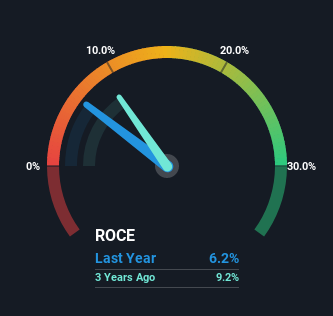- Malaysia
- /
- Industrials
- /
- KLSE:HAPSENG
Hap Seng Consolidated Berhad (KLSE:HAPSENG) Will Be Hoping To Turn Its Returns On Capital Around
Did you know there are some financial metrics that can provide clues of a potential multi-bagger? Ideally, a business will show two trends; firstly a growing return on capital employed (ROCE) and secondly, an increasing amount of capital employed. This shows us that it's a compounding machine, able to continually reinvest its earnings back into the business and generate higher returns. Although, when we looked at Hap Seng Consolidated Berhad (KLSE:HAPSENG), it didn't seem to tick all of these boxes.
Return On Capital Employed (ROCE): What Is It?
For those that aren't sure what ROCE is, it measures the amount of pre-tax profits a company can generate from the capital employed in its business. Analysts use this formula to calculate it for Hap Seng Consolidated Berhad:
Return on Capital Employed = Earnings Before Interest and Tax (EBIT) ÷ (Total Assets - Current Liabilities)
0.062 = RM908m ÷ (RM19b - RM4.1b) (Based on the trailing twelve months to March 2023).
Thus, Hap Seng Consolidated Berhad has an ROCE of 6.2%. Ultimately, that's a low return and it under-performs the Industrials industry average of 8.5%.
Check out our latest analysis for Hap Seng Consolidated Berhad

Historical performance is a great place to start when researching a stock so above you can see the gauge for Hap Seng Consolidated Berhad's ROCE against it's prior returns. If you want to delve into the historical earnings, revenue and cash flow of Hap Seng Consolidated Berhad, check out these free graphs here.
How Are Returns Trending?
When we looked at the ROCE trend at Hap Seng Consolidated Berhad, we didn't gain much confidence. Around five years ago the returns on capital were 10%, but since then they've fallen to 6.2%. However, given capital employed and revenue have both increased it appears that the business is currently pursuing growth, at the consequence of short term returns. And if the increased capital generates additional returns, the business, and thus shareholders, will benefit in the long run.
In Conclusion...
In summary, despite lower returns in the short term, we're encouraged to see that Hap Seng Consolidated Berhad is reinvesting for growth and has higher sales as a result. These growth trends haven't led to growth returns though, since the stock has fallen 49% over the last five years. So we think it'd be worthwhile to look further into this stock given the trends look encouraging.
If you'd like to know more about Hap Seng Consolidated Berhad, we've spotted 4 warning signs, and 2 of them shouldn't be ignored.
For those who like to invest in solid companies, check out this free list of companies with solid balance sheets and high returns on equity.
Valuation is complex, but we're here to simplify it.
Discover if Hap Seng Consolidated Berhad might be undervalued or overvalued with our detailed analysis, featuring fair value estimates, potential risks, dividends, insider trades, and its financial condition.
Access Free AnalysisHave feedback on this article? Concerned about the content? Get in touch with us directly. Alternatively, email editorial-team (at) simplywallst.com.
This article by Simply Wall St is general in nature. We provide commentary based on historical data and analyst forecasts only using an unbiased methodology and our articles are not intended to be financial advice. It does not constitute a recommendation to buy or sell any stock, and does not take account of your objectives, or your financial situation. We aim to bring you long-term focused analysis driven by fundamental data. Note that our analysis may not factor in the latest price-sensitive company announcements or qualitative material. Simply Wall St has no position in any stocks mentioned.
About KLSE:HAPSENG
Hap Seng Consolidated Berhad
An investment holding company, engages in the plantation, property investment and development, credit financing, automotive, trading, and building materials businesses in Malaysia and internationally.
Excellent balance sheet with proven track record.
Similar Companies
Market Insights
Community Narratives




